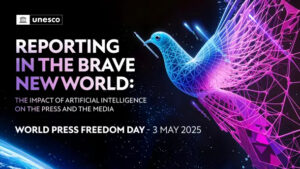 Tomorrow, May 3, 2025, marks the 32nd annual World Press Freedom Day—a global observance established by the United Nations to celebrate the fundamental principles of press freedom, evaluate its state worldwide, and honor journalists who have lost their lives in the line of duty. This day also commemorates the adoption of the Windhoek Declaration in 1991, which laid the foundation for a free, independent, and pluralistic press.
Tomorrow, May 3, 2025, marks the 32nd annual World Press Freedom Day—a global observance established by the United Nations to celebrate the fundamental principles of press freedom, evaluate its state worldwide, and honor journalists who have lost their lives in the line of duty. This day also commemorates the adoption of the Windhoek Declaration in 1991, which laid the foundation for a free, independent, and pluralistic press.
The theme for this year’s World Press Freedom Day is “Reporting in the Brave New World: The Impact of Artificial Intelligence on Press Freedom and the Media.” This focus highlights the transformative effects of AI on journalism, encompassing both opportunities and challenges. While AI can enhance news gathering and dissemination, it also raises concerns about misinformation, deepfakes, and the erosion of journalistic integrity. The theme underscores the need for ethical guidelines and human oversight to ensure that AI serves as a tool to support, rather than undermine, press freedom.
Press freedom is a cornerstone of democratic societies, enabling the public to make informed decisions and hold those in power accountable. It ensures transparency, fosters dialogue, and supports the protection of all other human rights. However, journalists worldwide continue to face threats, censorship, and violence. According to UNESCO, promoting the safety of journalists and combating impunity for those who attack them are central actions within its support for press freedom.
As we observe World Press Freedom Day 2025, it’s imperative to recognize the vital role of a free press in society and to advocate for the protection of journalists and the integrity of information. In an era increasingly influenced by artificial intelligence, safeguarding press freedom requires vigilance, ethical standards, and a commitment to truth.
Looking ahead, UNESCO will host the World Press Freedom Day 2025 Signature Event on May 7 at Bozar, the Centre for Fine Arts in Brussels. This gathering will convene journalists, policymakers, and media professionals to explore the profound impact of artificial intelligence on journalism and media. The event will feature plenary sessions on information as a public good in the AI era and will include the UNESCO/Guillermo Cano World Press Freedom Prize Ceremony.
For more details and to follow the event, visit the official UNESCO page: https://www.unesco.org/en/articles/world-press-freedom-day-2025-signature-event-reporting-brave-new-world-impact-artificial?hub=66704
